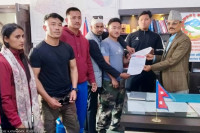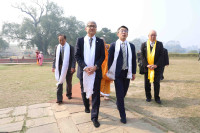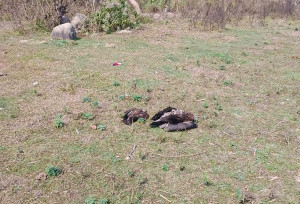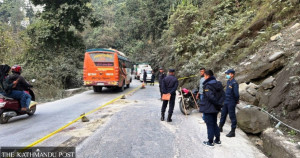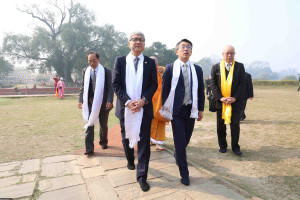Lumbini Province
Inside Rolpa district’s quest to go alcohol-free
Alcohol was banned during the Maoist insurgency in the district, but the spectre of alcoholism has made a comeback, worrying locals and officials.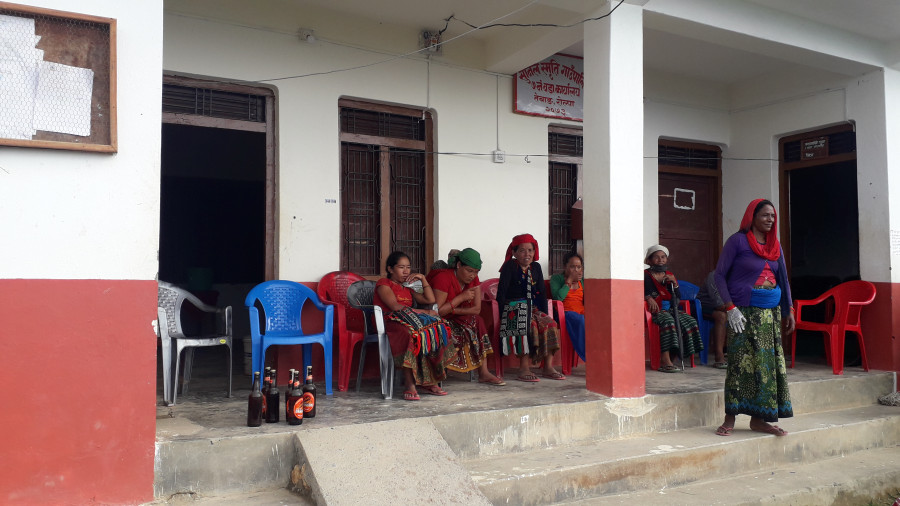
Kashiram Dangi
Ranasingh Damai left his village of Gharti Gaun in Rolpa for Libang, the district headquarters, after his home was severely affected by the Maoist insurgency. He also left his shop and belongings, worth hundreds of thousands of rupees, fearing action from the insurgents because he didn’t believe in their ideology. Since then, he has been residing in the Libang town and has never returned to his village, out of fear of “punishment” from the rebels.
In Libang, he is having a tough time making a living for a family of eight, including six children. “The Maoists didn’t let me collect my belongings,” Damai said. “My problems were neither heeded by the state nor the Maoists when they came into power. We had to flee our home to save our lives.”
The responsibility of earning enough to feed a large family started taking a toll on Damai, and he found solace in alcohol. “I know alcohol is bad, but it’s become a friend in need,” said Damai. “I can’t sleep during the night if I don’t drink a glass or two of alcohol.”
Alcohol has already created a rift in Damai’s family, and his problems are far from over. “I faced great difficulties when I came to Libang,” he said. “And, those difficulties stayed with me; and I have used alcohol to get over it.”
Another local in Libang, Manish, who requested his last name to be withheld for privacy reasons, professes the same addiction to alcohol. Manish runs a small shop in the town and says that he too depends on alcohol for a good night’s sleep. “I got addicted to alcohol when the insurgency was in full swing,” said Manish. “Back then I was perturbed by the war, now by alcohol itself.”
Alcohol was banned in Rolpa during the insurgency. Alcoholic beverages were prohibited from being produced and sold. But as the Maoists abandoned arms and the peace process took off, alcohol made a swift comeback in the towns and villages of Rolpa. Thabang, for instance, used to be known as a “communist village” during the insurgency, and there was a blanket ban on alcohol. Under the leadership of Pushpa Kamal Dahal, then commander in chief of the Maoist outfit, the production of ground apple took off in the village, a fruit that is majorly used to produce local beverages. The use of alcohol is rife and on the rise in Thabang and in other villages across the district.
“The number of patients suffering from alcohol-related ailments of the heart, respiration and blood pressure is on the rise,” said Kul Bahadur Dangi, a Senior Auxiliary Health Worker at the Rolpa District Hospital. Rolpa imports alcohol products worth Rs 20 million a year, according to data by the Rolpa District Chamber of Commerce.
This concerns the local representatives and member of various clubs and Mothers’ Group. As a result, numerous campaigns have been launched in the district, with the local units gearing up to ban alcohol. Local unit representatives say the ban would help maintain peace and societal harmony in the district. And while some campaigns have seen success, not everything has gone as planned.
Tribeni Rural Municipality, for instance, has banned the sale of alcoholic beverages during the day. Local representatives have concluded that alcoholism has degenerated societal values, and hence are supervising all seven wards in the municipality, imposing fines for breaching the rules. So far, Rs 500,000 has been collected as fine in the rural municipality. This has significantly reduced the number of alcohol users and incidents of domestic violence are less frequent, according to Shanta Kumar Oli, chief of the rural municipality. Oli said his office is coming up with employment campaigns to engage youths.
Other local units such as Sulichaur, Holeri, Gharti Gaun, Saatdobato and Nuwa Gaun have also taken measures to curb alcohol use, and they too haven’t been successful entirely. Most of the people still need to be aware of the negative impacts of alcohol, said Yama Lal Bista, Ward 6 chairman of Lungri Rural Municipality. “Though we have been trying to ban alcohol, it hasn’t been entirely successful,” Bista said. “We need to raise awareness among the people, with stern measures.”
Meanwhile, in Tebang village, a ‘mothers’ group’ (or aama samuha) recently brought all the alcohol they had confiscated from an annual carnival in Tebang village to the office of the Sunil Smriti Rural Municipality. They destroyed all the alcohol under the watch of the chief of the municipality and other local representatives. Members of the group took the step after they concluded that alcohol abuse by the local residents was making the villagers corrupt and undisciplined.
It’s been about a year since the women belonging to the group have been actively involved in controlling alcohol use among the locals. Other groups of students and teenagers have lent their hand in such endeavours as well, and this has taken the form of a campaign.
The campaign has branched out to other local units in the district as well. And a fair number of local representatives have joined their hands with the women to control alcohol use, while a few wards have been declared alcohol-free zones.
The women involved in the campaign say that excessive alcohol use has restricted the villagers from coming out of a drunken stupor for the last decade and a half. “This district will be developed only if we control alcoholism,” said Khaumali Ale, chairperson of Chispadhara Mothers’ Group. “The village has degenerated because of alcoholism in men and women. This is why we are dedicated to curb the problem.”
The group has also banned the production and sale of alcohol. “This is, by all means, a much-needed step and we have been assisting the members of the mothers’ group,” said Kali Kami, a member of the ward in Tebang village.




 20.81°C Kathmandu
20.81°C Kathmandu


